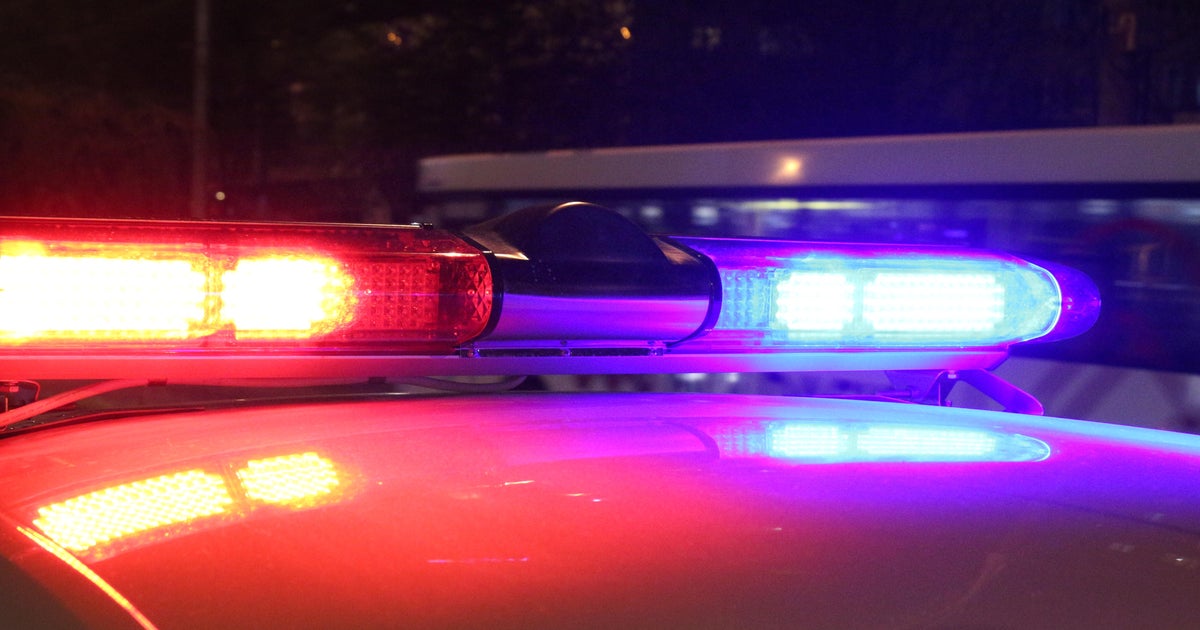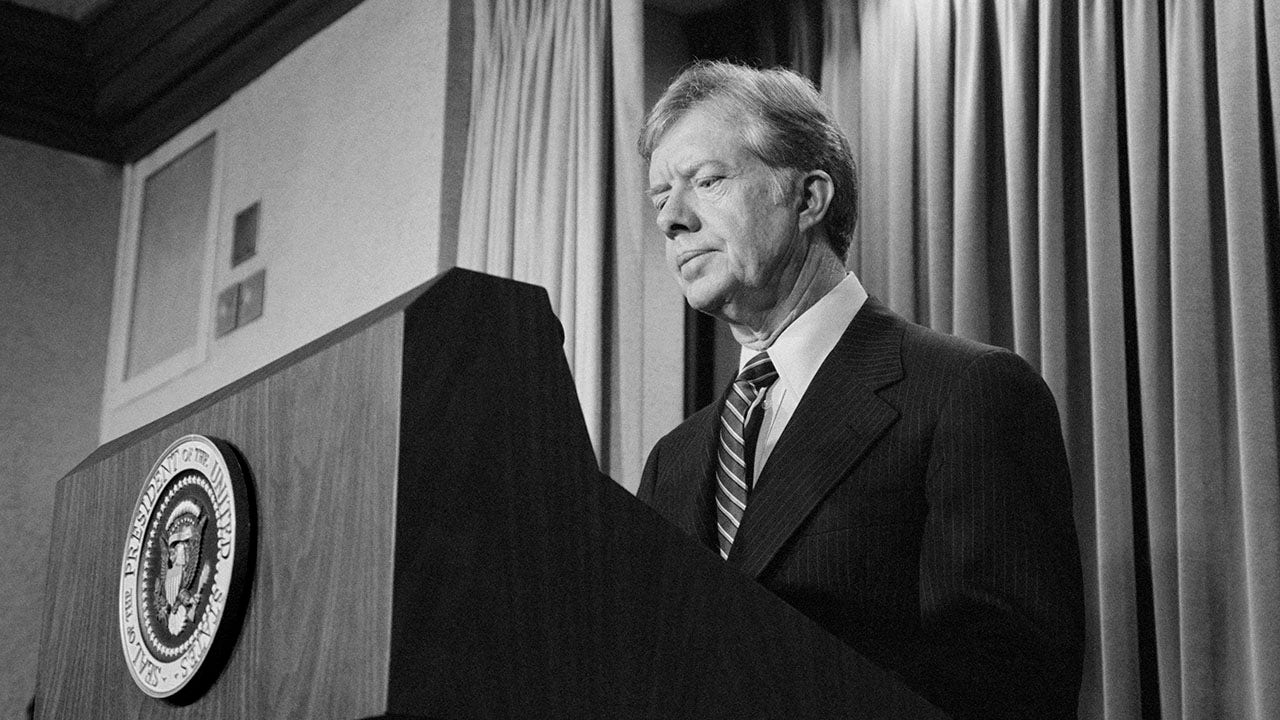World
NATO did not ‘create incentive’ for Putin to stop Ukraine war
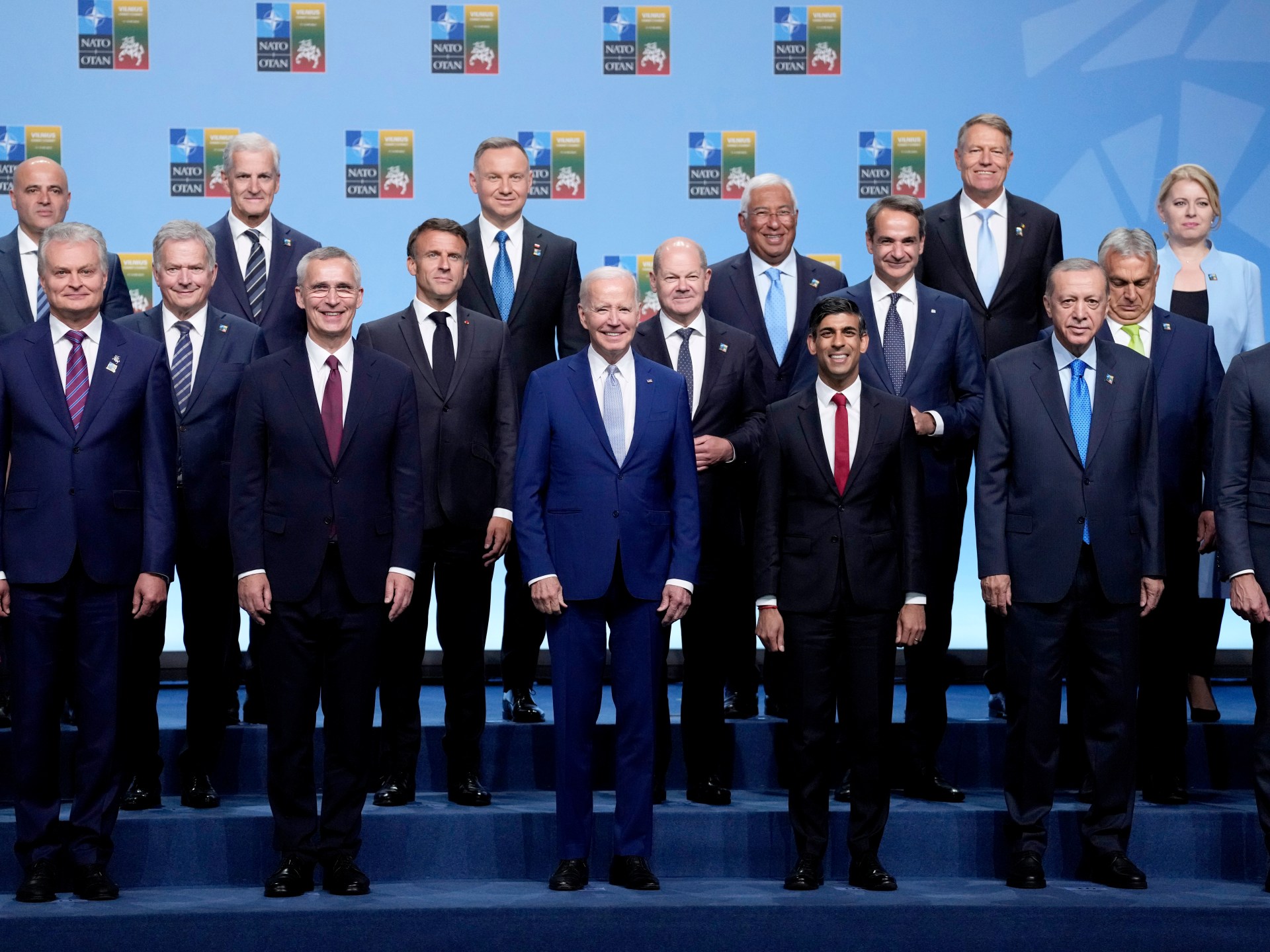
When Lithuanian President Gitanas Nausėda outlined his expectations ahead of this year’s NATO summit, he said he wanted the event to be remembered as the “summit of decisions – not just declarations”.
After two days of intense discussions and bilateral negotiations in the Lithuanian capital, Vilnius, leaders of the world’s largest military alliance made some big decisions, ranging from backing Sweden’s NATO membership to pledging security guarantees for war-torn Ukraine.
But when it came to the question of Ukraine’s NATO membership, the alliance decided it was not the right moment to invite Ukraine to join.
“We will be in a position to extend an invitation to Ukraine to join the Alliance when Allies agree and conditions are met,” NATO leaders said in a declaration.
“We reaffirm the commitment we made at the 2008 Summit in Bucharest that Ukraine will become a member of NATO, and today we recognise that Ukraine’s path to full Euro-Atlantic integration has moved beyond the need for the Membership Action Plan,” the NATO leaders said.
According to Bruno Lete, security and defence expert at the German Marshall Fund of the United States (GMF) in Brussels, while the declaration expresses strong and continued support for Ukraine, “NATO remains vague about the issue.”
“NATO is clearly deepening its relations with Kyiv, but regarding membership, the Vilnius Declaration gives little more reason for enthusiasm than the 2008 Bucharest Declaration did,” he told Al Jazeera.
“It positions NATO in such a way where in the future the alliance can choose to give Ukraine membership, or if necessary use Ukraine’s membership as a bargaining chip vis-à-vis Russia,” he said, noting that this would leave Kyiv disappointed.
While there has been broad consensus among NATO members about supporting Ukraine militarily at the NATO summit, the issue of setting a timeline for Kyiv’s membership remains divisive.
Some nations, including the US and Germany, have been wary that allowing Kyiv into the military alliance amid a war would also drag NATO into the battlefield with Russia — an outcome they want to avoid.
Meanwhile, eastern European nations and Poland, which have been among Ukraine’s most vocal supporters, continued to push for Kyiv’s membership.
Before he arrived at the summit on Tuesday, Ukrainian President Volodymyr Zelensky said NATO’s stance on Kyiv’s membership was “absurd” in a rare public show of anger towards the alliance.
But after meeting with NATO leaders in Lithuania, the Ukrainian leader softened his tone and said in a tweet that Ukraine understood it “cannot become a member of NATO while the war is ongoing. But then it will be our common strength when Ukraine joins the Alliance.”
In a press briefing in Vilnius alongside NATO’s Secretary-General Jens Stoltenberg, Zelenskyy said that “getting an invitation” at the summit would still have been “ideal” and acted as “a technical signal” in the face of Russian aggression.
‘Security victory’ for Ukraine
Meanwhile, NATO chief Stoltenberg continued to reaffirm to Zelenskyy that the country would become a member of the alliance in the future and told the Ukrainian president that he was looking forward to the day they “meet as allies”.
Stoltenberg also highlighted that it was important for Ukraine to receive strong security guarantees as it continues to fight against the Russian invasion.
After the summit, NATO members and the Group of Seven (G7) bloc of nations pledged to send new defence packages and missiles to Ukraine, which they said were part of long-term security assistance.
Zelenskyy hailed the new defence packages and said “The Ukrainian delegation is bringing home a security victory for Ukraine.”
He also welcomed the opening of the NATO-Ukraine Council and said it would give Ukraine the “necessary institutional certainty” on Kyiv’s NATO membership pathway.
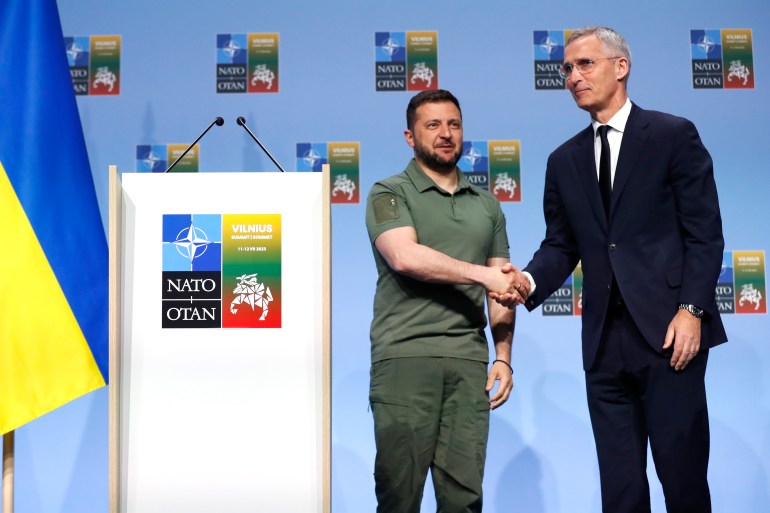
According to Stoltenberg, the council would act like a consultation mechanism between NATO members and Ukraine, whereby if Kyiv feels threatened, specific issues could be instantly discussed and decided by the council, bringing Ukraine closer to the alliance.
“This council will be a place where allies in Ukraine will jointly advance Ukraine’s Euro-Atlantic aspirations for membership in NATO,” said Harry Nedelcu, geopolitics director at Rasmussen Global and leader of its Ukraine Advisory Service, told Al Jazeera.
“But what would have been really a step forward, would be if this NATO-Ukraine Council was the body which could actually clearly set out the steps and assess the conditions that Ukraine would have to fulfil to become a member,”
“Basically all these questions are being left for another day and are being kicked down the road for the NATO summit in Washington next year,” Nedelcu said.
“The security guarantees for Ukraine are an interim solution to help Ukraine defend itself against Russia. But if this NATO summit was supposed to send a strong message to Russia’s [President Vladimir] Putin that the alliance is here to support Ukraine for as long as it takes, the glass is still half empty with no clear timeline for Kyiv’s membership.
“This does not create an incentive for Putin to stop the war,” Nedelcu said.
How has the Kremlin reacted?
In an interview with Al Jazeera on Tuesday, Russia’s Foreign Ministry spokesperson Maria Zakharova suggested that NATO was not extending an invite to Ukraine since some NATO nations like Poland considered western Ukraine part of its territory and intended to invade the region. She provided no evidence for the claim, which has been promoted without evidence by other Russian officials in the past.
She also said NATO was already at war with Russia because of its support for Ukraine militarily.
Lete rejected the claim and said NATO had not joined the war.
“Russia is falsely claiming it is fighting a war against all of NATO to justify to its own citizens the disastrous military campaign in Ukraine,” Lete said.
“Clearly, NATO has not violated Russian territory, nor has any ally fired a single shot at Russia. It’s therefore false to argue that the alliance is engaging in war,” he added.
After NATO and the G7 announced new defence packages for Ukraine, the Kremlin also warned that more security guarantees to Ukraine would be “dangerous” and infringe on Russia’s security.
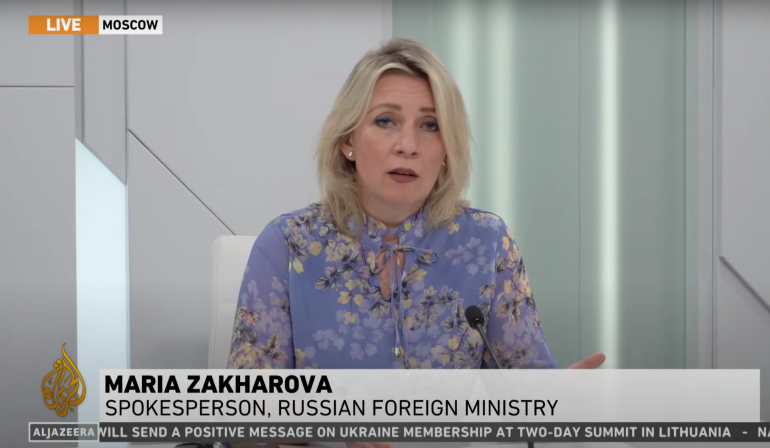
Meanwhile, Kremlin spokesperson Dmitry Peskov told reporters it was an ideal time for Moscow to maintain good relations with Beijing and said that “a visit to China” was on the Russian president’s agenda.
China has not condemned Russia’s actions in Ukraine, and it also downplayed the recent, short-lived Wagner Group rebellion.
At their meeting in Lithuania, NATO leaders said, “The deepening strategic partnership between the People’s Republic of China and Russia and their mutually reinforcing attempts to undercut the rules-based international order run counter to our values and interests.”
They also called on China to condemn Russia’s war of aggression against Ukraine and abstain from supporting Russia’s war effort in any way.
China’s European Affairs Director-General Wang Lutong said in a tweet that NATO’s accusations about China were “false”.
“They are purely driven by the Cold War mentality and ideological bias,” he said.
Turkey and Sweden secure wins
In addition to bolstering support for Ukraine, NATO members also fortified the alliance’s Baltic borders by giving Sweden the green light to join NATO.
Turkey and Hungary, which held up Sweden’s NATO accession for more than a year, agreed to let Sweden join.
Stoltenberg hailed the agreement on Sweden’s accession as “a historic step”.
But for Turkish President Recep Tayyip Erdoğan, backing Sweden’s NATO membership has appeared transactional.
Erdoğan had repeatedly said that he would approve Sweden’s NATO membership only if Stockholm dealt with Ankara’s “security concerns”, which included demands to expel members of the Kurdistan Workers’ Party (PKK), which Turkey has declared a “terrorist” organisation, and members of the Syrian Kurdish Democratic Union Party (PYD).
But on the eve of the military alliance’s summit, the Turkish president added another condition for Sweden’s NATO membership, saying he would approve Sweden’s accession if the European Union relaunched the long-stalled talks of Ankara’s EU membership.
After holding bilateral talks with Turkey in Lithuania on the eve of the NATO summit, European Council President Charles Michel said the 27-member bloc would cooperate with Ankara to discuss its EU membership. Sweden also said it would support Turkey’s EU membership.
“As a master of brinkmanship, Erdoğan dropped his veto when he assessed that the risks associated with continuing the veto had begun to outweigh the potential additional benefits,” Ozgur Unluhisarcikli, director of GMF’s office in Ankara, Turkey, told Al Jazeera.
Meanwhile, Turkey also expressed support for Ukraine’s NATO membership in the long run.
Unluhisarcikli said that these actions “won’t go unnoticed by Russia”.
“Turkey always had a pro-Kyiv, but not anti-Russia approach. But Erdoğan’s measured approach to the Wagner mutiny in Russia, returning Azov Battalion commanders to Ukraine, and reasserting support to Ukraine’s NATO membership against Sweden’s accession to NATO within three weeks will not go unnoticed by Russia,” he said.
“Because of these developments, Moscow may come to see Turkey as a less reliable facilitator and mediator,” Unluhisarcikli noted. “On the other hand, Russia does not have too many other alternatives to its relationship with Turkey.”

World
Jeff Baena, Film Director and Husband of Aubrey Plaza, Dead at 47

ad
World
World’s oldest person dies in Japan at 116
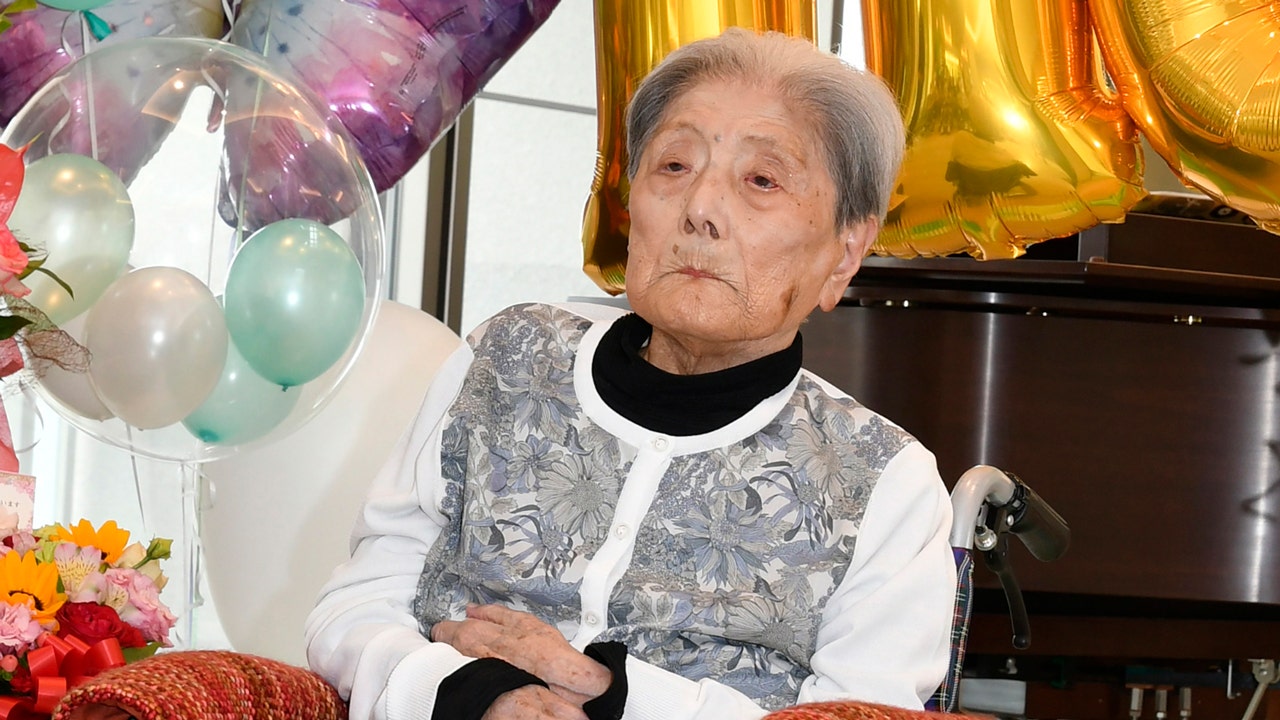
Tomiko Itooka, a Japanese woman who was the world’s oldest person, according to Guinness World Records, has died, an Ashiya city official said Saturday. She was 116.
Yoshitsugu Nagata, an official in charge of elderly policies, said Itooka died Dec. 29 at a care home in Ashiya, Hyogo Prefecture, central Japan.
Itooka, who loved bananas and a yogurt-flavored Japanese drink called Calpis, was born May 23, 1908. She became the oldest person last year after the death of 117-year-old Maria Branyas, according to the Gerontology Research Group.
Tomiko Itooka celebrates her 116th birthday at the nursing home where she lives in Ashiya, Japan, May 23, 2024. (Ashiya City via AP)
WORLD’S OLDEST MAN, DEAD AT 112, ATE THIS MEAL EVERY FRIDAY
When she was told she was at the top of the World Supercentenarian Rankings List, she simply replied, “Thank you.”
When Itooka celebrated her birthday last year, she received flowers, a cake and a card from the mayor.
Born in Osaka, Itooka was a volleyball player in high school and long had a reputation for a sprightly spirit, Nagata said. She climbed the 3,067-meter (10,062-foot) Mount Ontake twice.
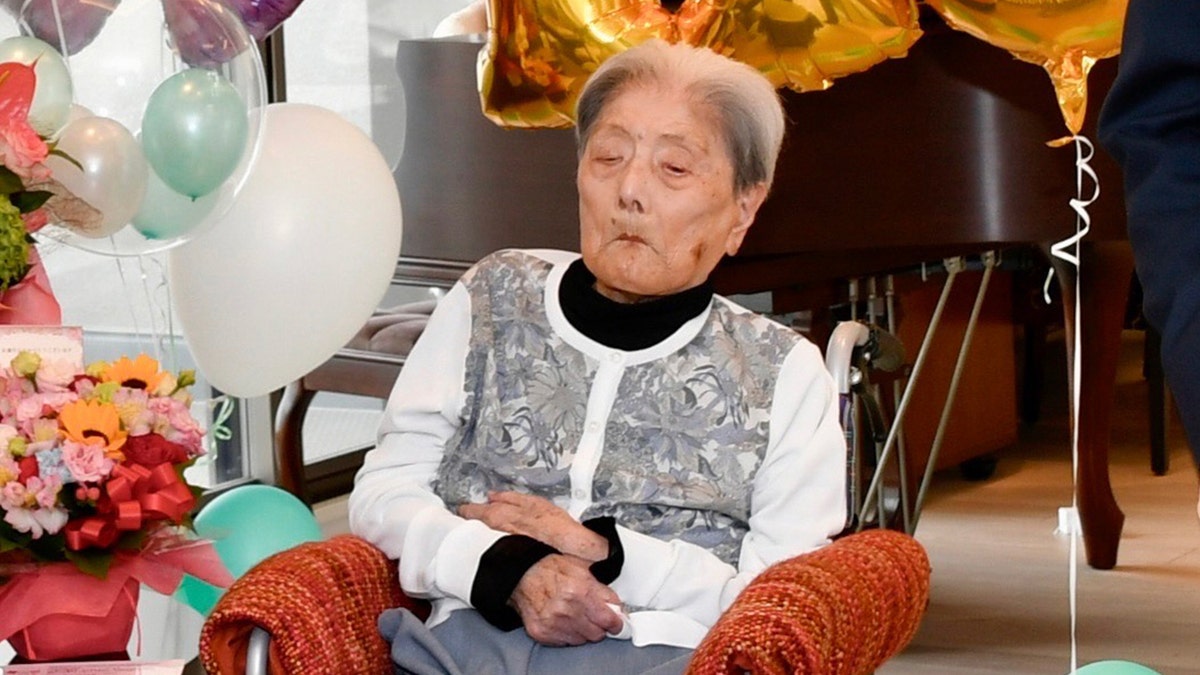
Tomiko Itooka celebrates her 116th birthday at the nursing home where she lives in Ashiya, Japan, May 23, 2024. (Ashiya City via AP)
OLDEST PERSON IN THE US, ELIZABETH FRANCIS, DIES AT 115 YEARS OLD IN HOUSTON
She married at 20, and had two daughters and two sons, according to Guinness.
Itooka managed the office of her husband’s textile factory during World War II. She lived alone in Nara after her husband died in 1979.
She is survived by one son and one daughter and five grandchildren. A funeral service was held with family and friends, according to Nagata.
According to the Gerontology Research Group, the world’s oldest person is now 116-year-old Brazilian nun Inah Canabarro Lucas, who was born 16 days after Itooka.
World
Austrian chancellor to resign after coalition talks collapse
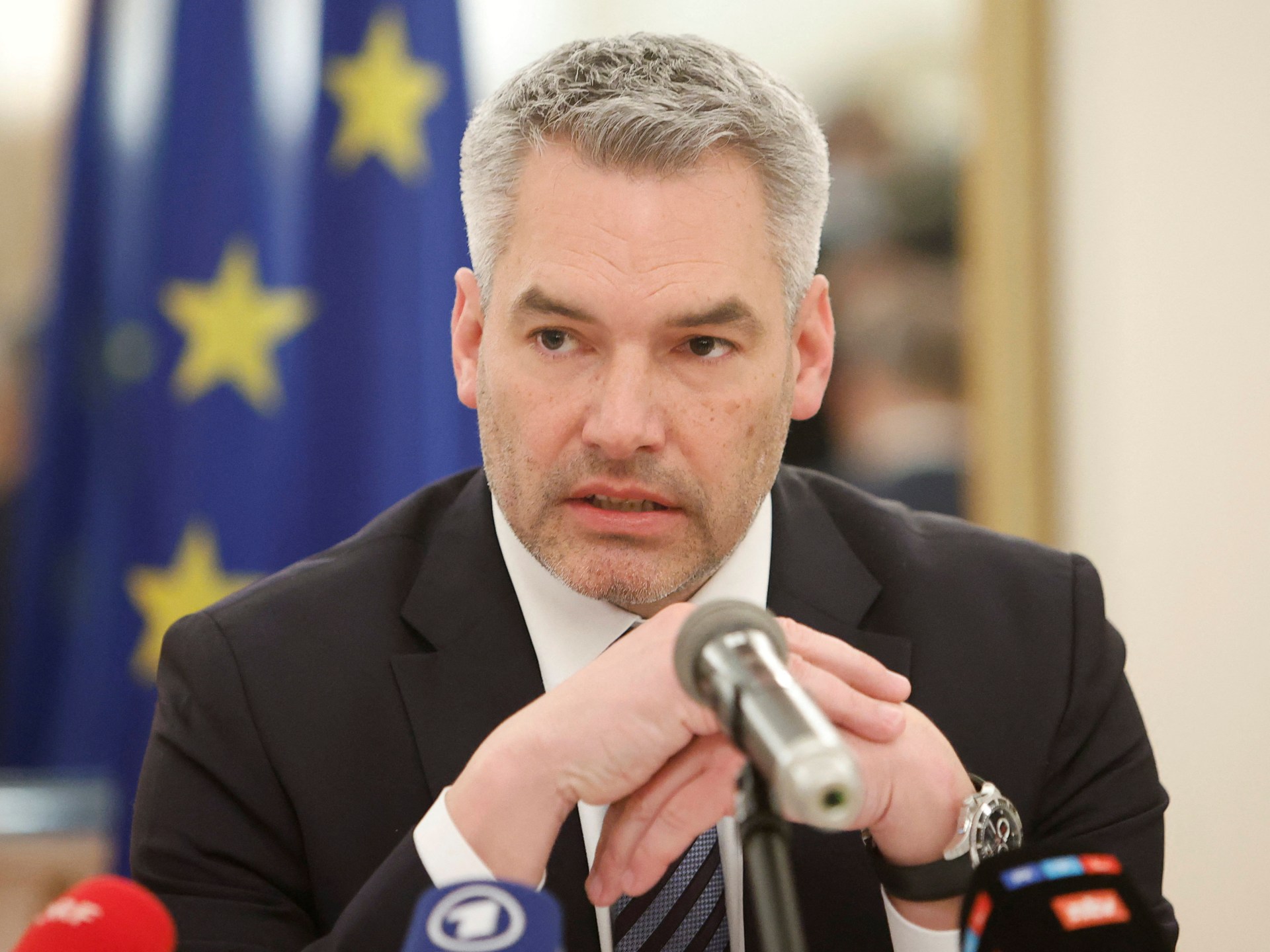
Nehammer says his People’s Party would not support measures that it believes would harm the economy or new taxes.
Austrian Chancellor Karl Nehammer has said he will resign after talks between the country’s biggest centrist parties on forming a government without the far-right Freedom Party (FPO) collapsed.
The announcement on Saturday comes a day after the liberal Neos party withdrew from the negotiations with Nehammer’s conservative People’s Party (OVP) and the Social Democrats (SPO).
“After the breakoff of the coalition talks I am going to do the following: I will step down both as chancellor and party chairman of the People’s Party in the coming days,” he said.
In a video posted to his social media accounts, the outgoing chancellor said “long and honest” negotiations with the centre-left failed despite a shared interest in fending off the gaining far right.
Nehammer emphasised that his party would not support measures that it believes would harm the economy or new taxes.
He said he would enable “an orderly transition” and railed against “radicals who do not offer a single solution to any problem but only live from describing problems”.
The far-right Freedom Party (FPO) won the first parliamentary election in its history in late September with close to 30 percent of the vote.
But other parties refused to govern in a coalition with the eurosceptic, Russia-friendly FPO and its leader Herbert Kickl, so President Alexander Van der Bellen in late October tasked Nehammer to form a coalition.
Nehammer’s announcement comes after he also failed to reach an understanding with the Neos party.
Neos leader Beate Meinl-Reisinger said progress was impossible and that “fundamental reforms” had not been agreed upon.
After the chancellor’s exit, the OVP is expected to convene to discuss potential successors.
The political landscape remains uncertain in Austria, with no immediate possibility of forming a stable government due to ongoing differences between the parties.
The president may now appoint another leader and an interim government as the parties try to find a way out of the deadlock.
The next government in Austria faces the challenge of having to save between 18 to 24 billion euros ($18.5-24.7bn), according to the European Commission.
The country’s economy has been in a recession for the past two years, is experiencing rising unemployment and its budget stands at 3.7 percent of gross domestic product – above the European Union’s limit of 3 percent.
-

 Health1 week ago
Health1 week agoNew Year life lessons from country star: 'Never forget where you came from'
-
/cdn.vox-cdn.com/uploads/chorus_asset/file/24982514/Quest_3_dock.jpg)
/cdn.vox-cdn.com/uploads/chorus_asset/file/24982514/Quest_3_dock.jpg) Technology1 week ago
Technology1 week agoMeta’s ‘software update issue’ has been breaking Quest headsets for weeks
-

 Business4 days ago
Business4 days agoThese are the top 7 issues facing the struggling restaurant industry in 2025
-

 Politics1 week ago
Politics1 week ago'Politics is bad for business.' Why Disney's Bob Iger is trying to avoid hot buttons
-

 Culture4 days ago
Culture4 days agoThe 25 worst losses in college football history, including Baylor’s 2024 entry at Colorado
-

 Sports4 days ago
Sports4 days agoThe top out-of-contract players available as free transfers: Kimmich, De Bruyne, Van Dijk…
-

 Politics2 days ago
Politics2 days agoNew Orleans attacker had 'remote detonator' for explosives in French Quarter, Biden says
-

 Politics2 days ago
Politics2 days agoCarter's judicial picks reshaped the federal bench across the country








